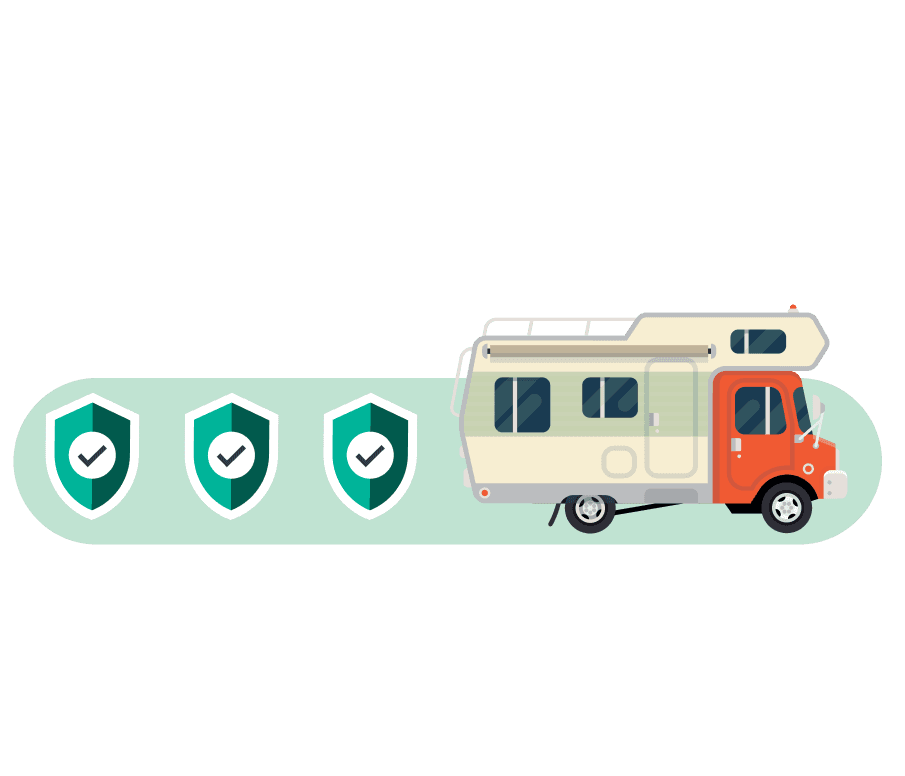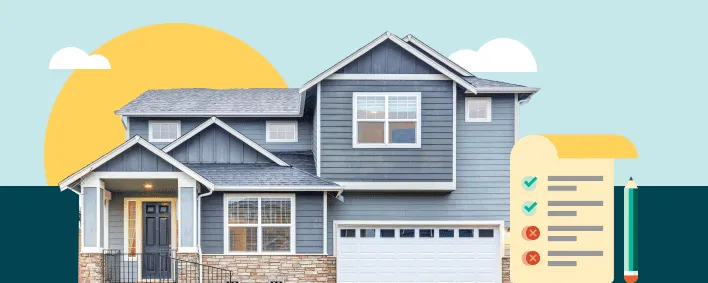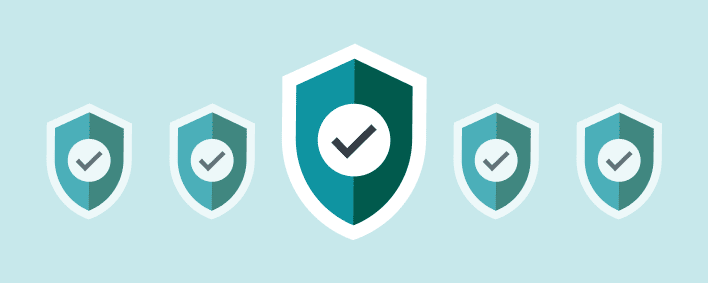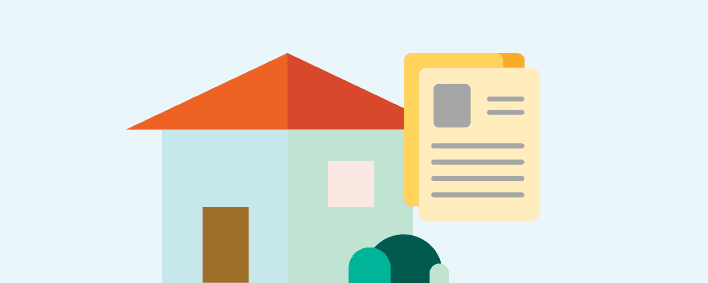Mobile homes have been around for decades. While there’s a misconception that mobile homes are the same as RVs or campers, this isn’t the case. If you have a mobile or manufactured home, you’ll need mobile home insurance.
Your mobile home insurance policy functions just like standard homeowners insurance, and is also called an HO-7 policy. While you’ll get fairly comprehensive coverage, an HO-7 policy doesn’t cover everything, so it’s important to understand how it works.
Here’s what you need to know about mobile home insurance:
- What’s mobile home insurance?
- What does mobile home insurance cover?
- How much is mobile home insurance?
- Factors that affect your mobile home insurance premium
- Additional coverages to consider
What’s mobile home insurance?
Mobile home insurance is just like homeowners insurance, but it’s specifically geared toward mobile and manufactured homes (factory-built homes constructed after June 15, 1976, are manufactured). It protects both your home’s structure and your personal property from unexpected events, like fires and hailstorms, and it provides liability coverage.
Compare home insurance from top carriers
- Fully online, buy home insurance coverage instantly
- Compare quotes from highly rated home insurance carriers in your area
- No spam, phone calls, upselling, or fake quotes
What does mobile home insurance cover?
Typically, mobile home insurance protects you from covered perils, which are events out of your control that can damage your home or your belongings. Mobile home insurance provides the following types of coverage:
- Dwelling: This covers your mobile home’s structure. Permanently attached structures, like decks and carports, are also underwritten with this coverage. HO-7 policies have open-perils coverage, which means they cover any disaster unless it’s one the policy specifically excludes. You should buy enough dwelling coverage to replace your mobile home in the event of a total loss.
- Other structures: This covers structures that aren’t permanently attached to your mobile home, like a shed.
- Personal property: This covers your personal belongings, like clothing and furniture, on a named-perils basis, which means it only protects you against perils listed in your policy.
- Personal liability: This covers your legal fees and the settlement if someone injures themselves on your property and sues you. It also covers you if you cause damage to someone else’s property.
- Medical payments: This covers medical bills if someone gets hurt on your property.
- Additional living expenses: This covers you if a disaster or repair temporarily displaces you from your home. It helps pay for expenses such as hotels, food, and transportation.
Learn More: What Is Personal Liability Coverage in Home Insurance?
Reimbursement levels and coverage limits
Depending on your insurer, your mobile home insurance will either come with actual cash value (ACV) coverage or replacement cost value (RCV) coverage.
ACV reimburses you for lost or damaged items, but deducts for depreciation when you file a claim. The same is true for features of your home: If you need to replace your roof, ACV coverage would pay for what your roof is worth now, not what it was worth when it was new.
However, if you have ACV coverage, you can upgrade to RCV coverage for your home and personal property. Replacement cost value coverage reimburses you for the current retail price to repair property damage or buy new things of comparable value.
Keep in mind: Regardless of which kind of coverage you have, it’ll be subject to a limit. For dwelling coverage, this limit is ideally 100% of the cost to replace your home. So, if you have $300,000 in dwelling coverage, you’ll only receive that amount from your insurer in the event of a total loss (minus your deductible).
Your personal property coverage usually covers 50% to 70% of your dwelling limit, so if you have $300,000 in dwelling coverage, your personal property limit would be between $150,000 and $210,000.
What does mobile home insurance exclude?
Mobile home insurance doesn’t cover everything. An HO-7 policy has some common exclusions, such as:
- Earthquakes
- Flooding
- In-transit accidents (damage that occurs while your home is being moved from one place to another)
You can typically purchase separate endorsements to cover those hazards. Additionally, mobile home insurance generally covers damage caused by wind, but if you live in a high-risk coastal area, your policy may have a separate deductible for damage from strong winds.
How much is mobile home insurance?
The amount you’ll pay for mobile home insurance depends on many factors, like your location. In California, mobile home insurance costs anywhere from $250 to $1,300 per year. But a mobile home policy in Orlando, Fla., from insurance carrier Kin averages $1,039 annually. It’s a good idea to get quotes from at least three insurers so you can compare insurance costs where you live.
Mobile home insurance discounts
Your mobile home insurance carrier likely offers discounts that can help lower your annual premium. Some common discounts include:
- Bundling: Many mobile home insurers offer discounts for buying more than one product from them, like home and auto insurance.
- Protective devices: Some carriers offer a discount if you install devices like security systems and smoke alarms.
- Model year: You may be eligible for a discount from your insurer if your home is newer.
- Autopay: Signing up for automatic payments can get you a discount on your premium.
- Original owner: Some insurers offer up to a 5% discount if you’re the original titleholder for your mobile home.
- Retirement: You may be able to save as much as 10% on your premium if you’re over the age of 55 and retired.
Check Out: What is a Homeowners Insurance Premium?
Factors that affect your mobile home insurance premium
Many factors affect the price of a mobile home insurance policy. Personal factors, your mobile home’s features, and your coverage all impact what you pay for your premium.
Personal factors
Mobile home insurance carriers look at several personal factors to determine your rate. Let’s look at some of the most common ones:
- Location: Where you live is one of the biggest factors that affects your insurance premium. Your risk of natural disasters, as well as things like the crime rate in your area, all contribute to your rate.
- Claims history: Your claims history can affect both eligibility and premiums. The more claims you’ve filed, the higher you can expect your rate to be.
- Insurance score: Most states allow insurance carriers to use your credit-based insurance score when setting your premium. Your insurance score uses factors like your credit history and outstanding debt to determine how likely you are to file a claim — the higher your score, the lower your rate.
Mobile home factors
Your mobile home’s features also affect your insurance rate. Influencing factors include:
- Replacement cost: The cost to repair or replace your mobile home is a major factor in determining your premium. A $400,000 mobile home will generally be more expensive to insure than a $150,000 mobile home.
- Condition of mobile home: Insurers also look at your mobile home’s condition when deciding your rate. For example, insurers pay close attention to your roof’s condition, since an older roof increases your risk of water damage inside the home.
- Type of mobile home: Manufactured homes can have single-wide, double-wide, and triple-wide floor plans. Each has a different width, length, and total square footage, and your floor plan helps insurance providers determine your premium.
- Age of mobile home: Older mobile homes cost more to insure because they often have outdated systems, such as plumbing or electricity, and they’re more susceptible to damage.
- Safety features: Many carriers offer discounts for added safety features, such as alarm systems.
Learn More: Home Insurance Replacement Cost vs. Actual Cash Value
Coverage factors
Your coverage also affects your insurance rate, including elements like:
- Coverage amount: The more coverage you have, the more you’ll pay for mobile home insurance.
- Deductible: Your deductible is the amount you must pay before your insurance kicks in. The higher the deductible, the lower the premium, since you’re offsetting more of the insurer’s costs. Just make sure your deductible amount is one that you can afford should you need to file a claim.
- Replacement cost vs. actual cash value: As previously mentioned, you generally have the option to choose a replacement cost value policy or an actual cash value policy for your dwelling and personal property coverage. Actual cash value coverage is typically less expensive, and replacement cost value coverage is more expensive.
Additional coverages to consider
While mobile home insurance is fairly comprehensive, you may wish to add some extra coverage for more peace of mind. Some coverages to consider purchasing include:
- Trip collision coverage: This coverage protects your home while it’s being transported. If it gets damaged in a collision during this time, your insurer will help you cover the costs.
- Flood insurance: Standard mobile home insurance policies don’t cover flooding. For this coverage, you’ll need to purchase an additional flood insurance policy from your insurer or from the National Flood Insurance Program.
- Earthquake insurance: Your mobile home insurance also won’t cover damage from earthquakes. You can purchase an earthquake insurance rider or get a separate policy for this coverage.
Compare home insurance from top carriers
- Fully digital experience — Fill out all of your insurance forms online, no phone call required!
- Top-rated carriers — Choose from a mix of highly reputable national and regional home insurance carriers.
- Data privacy — We don’t sell your information to third parties, and you won’t receive any spam phone calls from us.
Keep Reading: Everything You Need to Know About Home Insurance Claims
Disclaimer: All insurance-related services are offered through Young Alfred.





